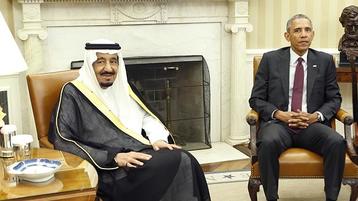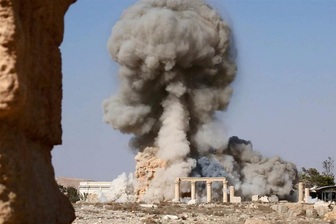|
Will you chip in £1 to help make sure that Jonathan Lundgren and other bee scientists can speak the truth without harassment?
Yes, I'll chip in £1 to help stop the censorship of bee science. This isn’t the first time we’ve seen corporate-influenced governments trying to silence bee scientists. In the U.K., the government silenced scientists who disagreed with a decision to lift a ban on bee-killing pesticides. Big Ag lobbyists wanted the ban lifted, but when the scientists wouldn't go along with it, the government simply told them not to publish their views. But this time the corporations picked on the wrong scientist. Jonathan Lundgren is refusing to back down. Now a judge has ruled that Jonathan's whistleblower complaint may go forward -- meaning he has a real chance of getting justice and showing how corporations are exerting undue influence over government research. [NEWTEKWORLDNEWS related reports:
0 Comments
Salman bin Abdulaziz became the monarch in January following the death of his half-brother King Abdullah.
Spectators saw a fleet of luxury cars in front of the hotel and red carpets laid down even in the parking lot. Politico reported that the Four Seasons hotel redecorated, rolling out red carpet to for the Saudi Royals. Almost everything has a golden touch, keeping in mind the aesthetic taste of the royal family. The famed Saudi profligacy is nothing new. Just last month, the monarch reserved an entire beach in the French Riviera to accommodate a 1,000-member party during the King's vacation, according to reports. The installation of an elevator from the Mirandole beach to the villa reportedly miffed some beach-going residents who objected to allowing King Salman this royal privilege. And the king shortened the planned three-week vacation following criticism against “the temporary privatization of public land.” With the Syrian refugee crisis hogging media headlines, the profligate waste of wealth is being questioned, with expectations that Saudi Arabia and the wealthy Arab states in the Persian Gulf should do much more to help their neighbor. According to a report by Amnesty International, “six gulf countries — Qatar, United Arab Emirates, Saudi Arabia, Kuwait and Bahrain — have offered zero resettlement places to Syrian refugees.” It is pertinent to note that none of these countries are signatories of the United Nations' 1951 Refugee Convention, which outlines refugee rights and defines the duties of signatory states to safeguard them. The image of a drowned Syrian toddler, his dead body lying unattended on a Turkish beach last week highlighted the chilling plight of the Syrian refugees fleeing a relentless civil war.
Germany on Tuesday decided to ease asylum rules for Syrians. The move relieves pressure on southern European nations as thousands additional migrants pour into the bloc.
Migration is here to stay The U.N. special envoy on the rights of migrants, Francois Crepe au in a statement said: “Building fences, using tear gas and other forms of violence against migrants and asylum seekers … will not stop migrants from coming or trying to come to Europe. Let’s not pretend that what the EU and its member states are doing is working. Migration is here to stay.” Are there easy answers? The world is witnessing a mammoth period of instability and conflict. The Washington Post quoted the United Nations saying: “It is the largest pool of refugees, asylum-seekers and internally displaced persons since the ravages of World War II." Recent events of refugee crisis reported by media outlets shows that the world’s refugee management system is collapsing. Compared to sheer magnitude of refugee influx, the systems and processes in place to deal with such crisis is inadequate. And the countless reports examining the causes and impact of a massive wave of migration driven by war, oppression and poverty is no panacea for the looming disasters that threatens to reshape the world in many ways. Even newer or novel terminologies to describe the situation or attempts to oversimplify the migrant issue brings no tangible solution for the refugees and nations facing the influx. It is pertinent to note that the UNHCR positions its existence on durable solutions to refugee problems through “voluntary repatriation; local integration; or resettlement to a third country in situations where it is impossible for a person to go back home or remain in the host country.” Sadly for the million refugees landing on the shores of Europe, these solutions are either non-existent or nowhere in sight. It’s about time to reduce escalating global conflicts that trigger mass displacement of humans. And, the need to frame coherent and comprehensive migration policies that could address the appalling humanitarian problem.
The Palmyra temple was a popular tourist site until the ISIS takeover. The ISIS takeover of Palmyra and the nearby modern town of Tadmur in May had already prompted speculations over the imminent threat to the UNESCO World Heritage Site.
Noting the destruction, Press TV reported: “Palmyra was one of the most important cultural centers of the ancient world. In the 1st and 2nd centuries, Palmyra was the crossroads of several civilizations, combining Greco-Roman architectural techniques with local tradition and Persian influences. Today it signals the end of civilization with the wanton destruction of human heritage.” According to the Huffington Post, “The temple dates to the first century and is dedicated to the Phoenician god of storms and fertilizing rains.” The world heritage site stood witness to the depth of the pre-Islamic history in Syria. The conflict between ISIS extremists and Syrian regime beginning 2011 has taken a massive toll on a number of ancient sites and artifacts. The ISIS extremists justified the destruction of shrines and temples on the pretext of banning idolatry. However, the ulterior motive is money because they reportedly sell the antiquities in the black market for cash. Notably, the destruction of large number of shrines in the conflict zones spanning Iraq and Syria are not just confined to non-Islamic shrines and monuments. According to Professor Clemens Reichel, Associate Curator for the Ancient Near East at the Royal Ontario Museum in Toronto: “The major targets, or the absolute largest number of monuments and shrines that have been destroyed by ISIS has not been Christian or antique shrines, it’s been Islamic shrines. So it’s a warfare not just against other religions and ethnicities, it’s a warfare against their own people: it’s wiping out all identities, all traditions, anything that would basically make humanity, human.”
Reportedly, the Mangalore police arrested members of the group, most of them affiliated to the Bajrang Dal—a rightwing Hindu outfit affiliated to the Rashtriya Swayamsevak Sangh(RSS), the ideological counsellor of the ruling Bharatiya Janata Party (BJP). The Hindu quoted City Police Commissioner S. Murugan, saying: “The police reacted swiftly on learning about the incident. While assaults cannot always be prevented just by the police, what is alarming is the public reaction to the incident. Though hundreds were watching the assault, none dared to question the assailants.” The motivation to attack the youth reportedly springs from an erroneous concept of Love Jihad propagated by right wing groups. The assumption is that Muslim youths use love jihad as a resort to religious conversion by luring “innocent” Hindu girls into marriage. The incident bring to focus the 2009 Mangalore pub attack incident. Vigilante right-wing groups from the Sri Ram Sene party stormed a pub, dragged women by their hair and slapped them, accusing them of wearing jeans, t-shirts and denigrating Hindu culture. Reportedly such incidents of moral policing involving right-wing activists are common in Mangalore.
|
Yourvoice
This blog will include a range of reports and opinion pieces covering many issues. It will be YOUR Voice. Archives
April 2017
Categories
All
|






 RSS Feed
RSS Feed
